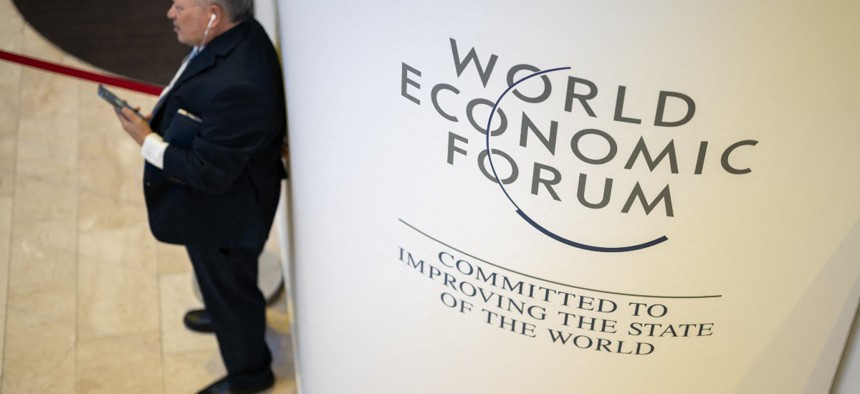Push for More Quantum Tech Investment Reaches World Economic Forum

A participant uses his mobile phone at the Congress centre during the World Economic Forum (WEF) annual meeting in Davos on January 18, 2023. FABRICE COFFRINI/AFP via Getty Images
WEF leadership announced the development of a new blueprint aimed at helping nations navigate the advent of quantum computing technologies.
The global race to spearhead innovation in quantum technology research and development hit the World Economic Forum held in Davos, Switzerland, with officials announcing the development of a National Quantum Blueprint to serve as guidance for all nations looking to invest in their burgeoning quantum technology ecosystems.
Formally announced on Wednesday, Jan. 18, the blueprint will be largely informed by the WEF’s Quantum Computing Governance Principles released one year ago. It takes into account the various fields quantum technology—specifically computing—stands to impact, and how nations can better invest and prepare for its applications.
“For those who lead in this field [quantum computing], the impact will be far-reaching and significant, stimulating countries’ industrial bases, creating jobs, and providing economic and national security benefits,” the blueprint’s introductory page reads.
The WEF agenda specifically cites the major cybersecurity implications that will result from the development of quantum computing technology. The blueprint looks to help both the countries that have and have not yet invested in quantum technology research and development navigate the emerging landscape.
"I would call them soft governance mechanisms—frameworks and guidelines and not regulatory,” Arunima Sarkar, the lead of the WEF’s Artificial Intelligence and Machine Learning program, told Nextgov.
Sarkar confirmed that the WEF will develop the blueprint over the course of 2023, with no firm date for release.
While the quantum-related agenda at the WEF emphasizes the wide-ranging risks to data privacy with the advent of quantum computing, other technologies like quantum simulation and quantum sensing were also discussed as promising new systems that can positively impact industries like pharmacology, industrial chemistry and imaging technologies.
Calculations published by the WEF indicate that the global investment in quantum tech research and development totaled around $30 billion in 2022, with countries like China, the U.S., the U.K. and Canada leading in funding allocations. On the private investment side, the U.S. and E.U. are home to the highest number of quantum tech-related businesses and startups.
In addition to spotlighting industry sectors quantum technology stands to impact, the WEF agenda aims to proactively tackle the burgeoning “quantum divide” forming between countries with more advanced quantum research investment programs and countries that have yet to dispense the same level of funding.
The global forum advocated for bilateral partnerships between countries––something the U.S. has spearheaded in recent months.
“By working together with national government and regional economic associations, we aim to close the divide before the quantum industry takes off even further,” the WEF agenda notes.
Beyond international partnerships to further quantum technology development, the U.S. has been working to safeguard its critical infrastructure networks by implementing post-quantum cryptography measures ahead of a functional quantum computer.
In 2022, the National Institute of Standards and Technology previously released four quantum-resistant algorithms designed to safely encrypt networks. Relatively fresh legislation compliments the larger federal push for quantum computing readiness, including the Quantum Computing Cybersecurity Preparedness Act, which was signed into law in December by President Joe Biden.
Prior to the bill’s ratification, the Biden administration released a memorandum catalyzing the governmentwide network migration to post-quantum cryptography standards with a deadline of 2035.






